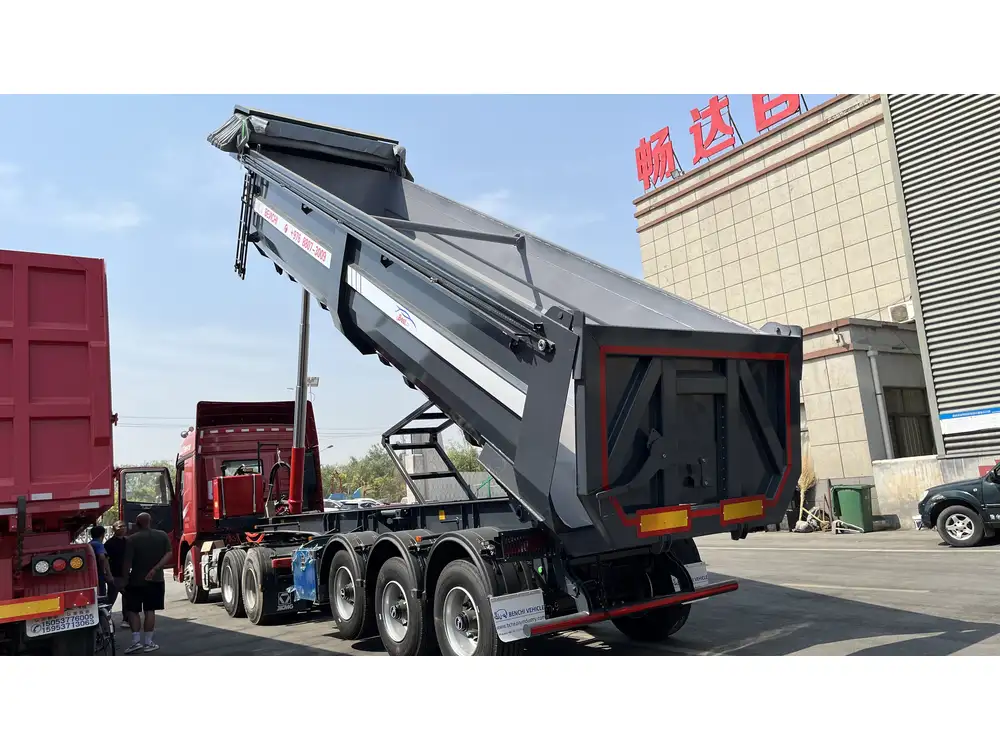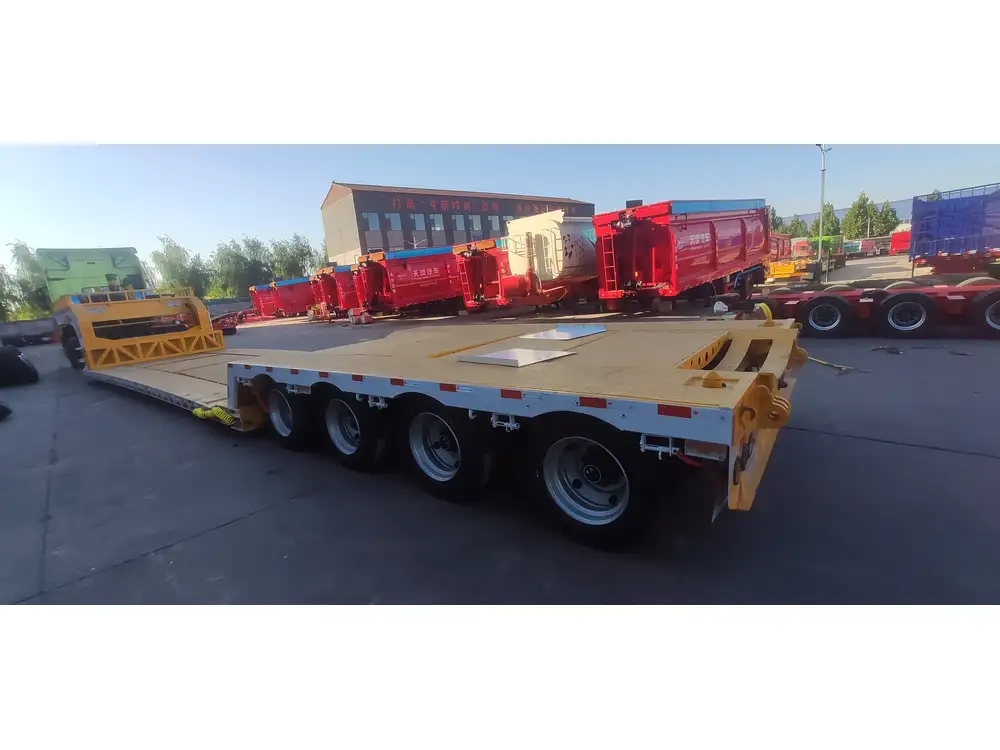When operating a dump trailer, selecting the appropriate battery is crucial for optimizing performance, enhancing reliability, and extending equipment lifespan. Dump trailers have unique power demands, especially when lifting and lowering heavy loads. In this article, we will delve into the different types of batteries suitable for dump trailers, their specifications, advantages, and how to choose the best one for your specific needs.
Understanding Dump Trailer Battery Requirements
A dump trailer uses hydraulic systems powered by batteries, which require ample voltage and capacity to ensure efficient operation. Here are several factors to consider regarding battery requirements:
- Voltage: Most dump trailers typically operate with a 12V or 24V electrical system. It’s essential to select a battery that matches the voltage requirement of your dump trailer.
- Capacity (Ah): The battery’s capacity, measured in amp-hours (Ah), indicates how much energy it can store and supply over time. A higher Ah rating correlates with longer runtimes, which is particularly beneficial during extended or heavy hauling operations.
- Discharge Rate: Dump trailers often require a burst of power for lifting the loads, necessitating batteries that can handle high discharge rates without significant voltage drops.
- Durability and Size: The physical dimensions and robust construction of the battery should match the trailer’s design while ensuring it is capable of withstanding various environmental conditions.
Types of Batteries for Dump Trailers
In general, two main types of batteries are widely recognized for their effectiveness in powering dump trailers. These are Lead-Acid Batteries and Lithium-Ion Batteries. Let’s explore each in detail.

1. Lead-Acid Batteries
Description: Lead-acid batteries are the most common type of battery used in dump trailers, primarily due to their affordability and availability. They come in two variations: Flooded and Gel.
| Type | Advantages | Disadvantages |
|---|---|---|
| Flooded | – Cost-effective | – Maintenance required (water levels) |
| – Well-established technology | – Limited lifespan | |
| Gel | – No spillage, safer to handle | – Higher initial cost |
| – Long shelf life | – Sensitive to temperature extremes |
Best Practices for Lead-Acid Batteries: If you choose a lead-acid battery, be sure to:
- Regularly check and maintain water levels in flooded batteries.
- Keep terminals clean to prevent corrosion.
- Store the battery in a temperature-controlled environment whenever possible.
2. Lithium-Ion Batteries
Description: Lithium-ion batteries are rapidly gaining traction in various applications, including dump trailers. Although initially more expensive than their lead-acid counterparts, their performance characteristics often justify the cost.
| Type | Advantages | Disadvantages |
|---|---|---|
| Lithium-Ion | – Longer lifespan (up to 10 years) | – Higher upfront cost |
| – Lightweight and compact | – Requires specific chargers | |
| – Faster charging times | – Sensitive to overcharging |
Best Practices for Lithium-Ion Batteries: To make the most of your lithium-ion battery, ensure:
- Use compatible chargers designed for lithium-ion technology.
- Implement a battery management system (BMS) to monitor charge cycles.
- Store in a cool, dry place to maximize lifespan.
How to Choose the Right Battery for Your Dump Trailer
Choosing the right battery is a multi-faceted process that involves assessing your specific dump trailer’s workload, frequency of use, and overall performance expectations. Here are some key considerations:

Evaluate Your Power Needs
- Usage Frequency: If you frequently operate the dump trailer for extended periods, select a battery with a higher capacity (Ah) rating.
- Lift Requirements: Calculate the weight of the loads being lifted to determine the necessary power surge required for operation. A battery with a high discharge rate is crucial here.
Environment and Durability
- Exposure to Elements: If your dump trailer operates under extreme weather conditions (e.g., hot summers, cold winters, or wet environments), consider investing in a lithium-ion battery or a sealed gel lead-acid battery to avoid environmental damage.
- Physical Size & Fit: Ensure that the battery selected fits securely within the designated compartment of your dump trailer.
Budget Consideration
- Initial Investment vs. Long-term Cost: Weigh the initial costs of the batteries against their lifespan and performance. While lead-acid batteries have lower upfront costs, lithium-ion batteries may reduce long-term operation expenses due to less frequent replacements.

Maintenance Tips to Ensure Longevity
Once you have selected the suitable battery type for your dump trailer, maintaining it appropriately is crucial. Here are some essential maintenance tips:
Regular Inspections
- Check Connections: Inspect battery terminals for tight connections to minimize resistance.
- Cleanliness: Keep terminals free of corrosion; a little baking soda paste can neutralize acid buildup if necessary.
Monitoring Charge and Discharge Cycles
- Charge Regularly: Don’t allow your battery to discharge completely before recharging; this can significantly reduce lifespan, especially in lead-acid batteries.
- Use Smart Chargers: Invest in smart chargers capable of managing battery health by preventing overcharging and in-depth monitoring.

Storing Batteries
- Temperature Control: Store batteries in a controlled environment, ideally between 32°F and 70°F (0°C to 20°C).
- Maintain Charge: If you won’t be using the dump trailer for an extended period, maintain the battery at a 50%-80% charge to prevent sulfation in lead-acid or over-discharge in lithium-ion batteries.
Conclusion: Making the Right Choice
Choosing the best battery for your dump trailer is imperative for optimizing its performance, reliability, and longevity. We have analyzed the advantages and disadvantages of both lead-acid and lithium-ion batteries to equip you with the necessary insights to make an informed decision. Assessing your specific needs—considering usage frequency, environmental exposure, and budget—will guide you to the most suitable option.
By maintaining your battery properly, regardless of the type chosen, you can ensure your dump trailer operates efficiently and effectively, significantly enhancing productivity and performance.
Frequently Asked Questions (FAQ)
1. How often should I replace the battery in my dump trailer?
The lifespan of lead-acid batteries is typically between 3-5 years, while lithium-ion batteries can last up to 10 years if properly maintained.
2. Can I charge a lead-acid battery with a lithium-ion charger?
No, using a lithium-ion charger on a lead-acid battery can damage it and pose safety risks, as the charging specifications differ markedly.
3. What is the ideal amp-hour (Ah) rating for a dump trailer battery?
The ideal Ah rating can vary based on usage; however, a range between 100Ah to 200Ah is commonly recommended for most applications.
4. Why is a battery management system (BMS) essential for lithium-ion batteries?
A BMS helps monitor battery health, ensuring balanced charge/discharge cycles and preventing scenarios such as overcharging or deep discharge that could severely impair battery life.
5. How do environmental factors affect battery choice?
Extreme temp variations can lead to reduced performance and lifespan in batteries. Select a battery type that can withstand the conditions your dump trailer is exposed to for optimal performance.
By addressing each aspect surrounding battery selection for dump trailers, we ensure not only a seamless operational experience but also a significant enhancement in the lifespan and reliability of your equipment.



